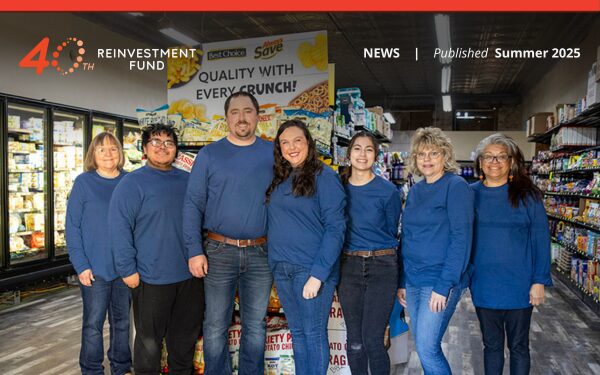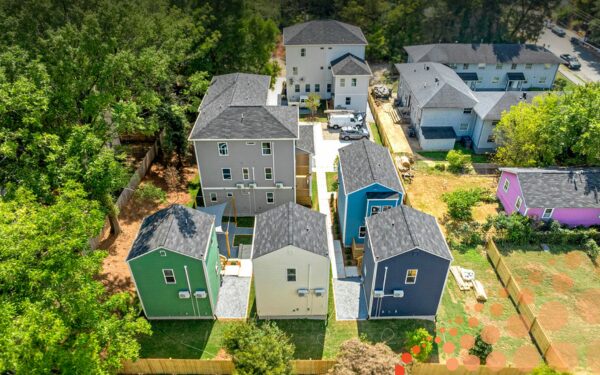Reinvestment Fund Summer Newsletter 2025

Expanding Food Access Across the Nation
Reinvestment Fund recently announced nearly $3 million in financial assistance awards to 14 retail and food retail supply chain projects through America’s Healthy Food Financing Initiative Food Access and Retail Expansion (HFFI FARE) Fund. The HFFI FARE Fund investment will complement the ongoing national HFFI program, which addresses food access complexities in communities across America.
Similar HFFI funding has already been used across the country to revitalize community hubs like Main Street Mercantile in rural Lebanon, Kansas. As the only source of staple goods, fresh produce, and hot meals, the market plays a critical role in ensuring food access for local residents, particularly low-income families and SNAP beneficiaries. When the market fell into disrepair, a 2021 HFFI grant from Reinvestment Fund helped revive this essential community resource.
In addition to the FARE Fund, Reinvestment Fund recently awarded nearly $1 million in grants and technical assistance as a part of the Southeast Food Forward program and more than $549,000 to 14 local Philadelphia organizations through the Philadelphia Food Justice Initiative.
Thriving communities need a resilient food supply chain that provides quality jobs and local solutions can revitalize low-income communities. Last year, Reinvestment Fund supported 16 food retail and supply chain partnerships across the country and loaned over $22 million in food-related transactions according to our recently released 2024 Annual Report.

Focusing on the National Housing Shortage
A new report, written in partnership by Reinvestment Fund’s Ira Goldstein with Moody’s Analytics, PolicyMap, and the Urban Institute, presents the first comprehensive national housing gap analysis at the neighborhood level, revealing a decade-long shortfall in housing production that has driven up prices and rents.
The report includes localized estimates of the shortages at the census tract-level for nearly 350 U.S. cities with population over 100,000 and provides a foundation upon which policymakers and investors can work to address the market shortfalls.
In Atlanta, the housing production shortfall means that there are fewer units available and the ones that exist are subjected to the systems of inequity that result in racial disparity. According to a new report from Policy Solutions, across the Atlanta metro region, mortgage applicants of color are more likely to be denied conventional loans than White applicants with similar financial qualifications.
Reinvestment Fund continues to support the development of affordable housing in places like Atlanta. Through our flexible loan financing that works with mission-focused developers like Fortas Homes, Reinvestment Fund is supporting residential development that is affordable and responsive to the needs of the local community. Our new financing partnership with Towne Property Co., led by Daniel Alexander of the Growing Housing Developers (GHD) cohort will also preserve affordable housing in Metro Atlanta.
News & Resources
- Welcome to new staff Shavone Robinson, Michael Mannino, and Laura Montás-Brown. Congrats to our newly promoted Managing Director of Corporate Communications Morgan Spade and Strategic Communications Manager Jacob Kraybill.
- Congratulations to Reinvestment Fund’s Sharon Mullings-Neilson who will be playing a leadership position on the newly created Special Committee on Early Childhood Development in Philadelphia. The Committee aims to enhance Philadelphia’s early childhood systems to improve outcomes for children under five and address poverty, equity, and economic opportunity.
- Reinvestment Fund continues to celebrate our 40TH Anniversary. Follow along as we reflect on the past and look toward the future.
- A new Maryland law aims to reduce racial bias in home appraisals by eliminating the bachelor’s degree requirement for certain appraiser licenses, addressing systemic undervaluation of homes in predominantly Black neighborhoods. Reinvestment Fund’s Ira Goldstein added insight during recent NPR Baltimore story.
- “We are steadfast stewards—not only of our funders’ capital, but of the deep trust communities place in us.” That’s how Sara Vernon Sterman, Chief Program Officer at Reinvestment Fund, describes what drives the organization’s mission. Watch Sara share why our work matters—and why more people should care.
- Over nearly a decade, the Invest Health initiative, led by Reinvestment Fund and supported by the Robert Wood Johnson Foundation, has offered powerful lessons about what it takes to advance health equity through community investment. This evaluation report highlights key findings and lessons from the initiative.
- Congrats to our Sara Patenaude, PhD—a data-driven changemaker advancing equity and opportunity through strategic community investment—for being recognized as a ULI Atlanta 2025 Changemaker.
- The Damien Center’s new Mosaic Building in Indianapolis—a state-of-the-art facility offering comprehensive HIV care, mental health services, and community support for up to 25,000 people annually was supported by Reinvestment Fund’s capital.
- After nearly four decades of closure, the historic Lansdowne Theater is set to reopen following a restoration that transformed the 1927 venue into a live entertainment hub. Reinvestment Fund played a pivotal role in the financing of this project—including bridge loans and energy efficiency financing through the Pennsylvania Green Energy Loan Fund—to support both the theater’s revival and its long-term sustainability.
- In 2023, HFFI grant recipient Dorchester Food Co-op opened its doors in Boston’s largest and most diverse neighborhood, fulfilling a vision of more than a decade in the making.